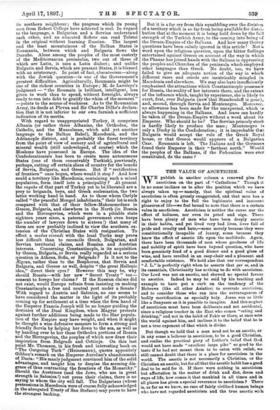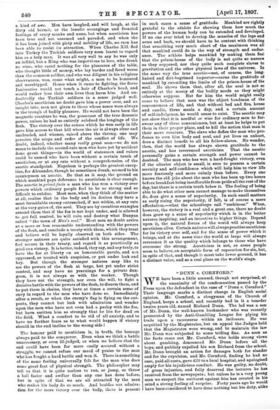THE VALUE OF ASCETICISM.
WE publish in another column a renewed plea for asceticism on the part of " Catholicus." Though it. in no sense inclines us to alter the position which we have always taken up — namely, that the spiritual value of asceticism is often grossly exaggerated, and that man has a right to enjoy to the full the legitimate and innocent pleasures of life—we feel bound to note that there is a certain value in asceticism. Asceticism is neither the cause nor the effect of holiness, nor even its proof and sign. There have been plenty of men who have been deeply ascetic in their habits, and yet lived very bad lives, lives full of pride and cruelty and hate,—some merely because they were constitutionally incapable of luxury, some because they knew the effect of ascetic life upon the multitude. Again, there have been thousands of men whose goodness of life and nobility of spirit have been beyond question, who have been genuinely fond of a good dinner and a good glass of wine, and have revelled in an easy-chair and a pleasant and comfortable existence. We hold also that our correspondent " J. L." is perfectly right when he asserts that per se, and in its essentials, Christianity has nothing to do with asceticism. Our Lord was not an ascetic, and showed no special favour to ascetics. Indeed he may be said by his teaching and example to have put a curb on the tendency of the Hebrews (like all other Asiatics) to overrate asceticism, and to consider those who ran into the extravagances of bodily mortification as specially holy. Jesus was as little like a Sunyasee as it is possible to imagine. And this neglect of asceticism must have been deliberate and not accidental, since a religious teacher in the East who comes "eating and drinking," and not in the habit of Fakir or Goru, at once sets the world against him, and inclines it to the belief that he is not a true exponent of that which is divine.
But though we hold that a man need not be an ascetic, or in any sense a believer in asceticism, to be a good Christian, and realise the practical piety of Luther's belief that God would not have made "excellent large pike" so good to the taste if he had not meant them to be eaten with relish, we still cannot doubt that there is a place for asceticism in the world. The ascetic is not necessarily a Christian, or the Christian an ascetic, but for all that the ascetic habit has a good deal to be said for it. If there were nothing in asceticism but affectation in the matter of drink and diet, dress and ways of life, how comes it that mankind in all times and in all places has given a special reverence to asceticism P There is, as far as we know, no race of fairly civilised human beings who have not regarded asceticism and the true ascetic with
a kind of awe. Men have laughed, and will laugh, at the dirty old hermit, or the lunatic scourgings and frenzied fastings of crazy monks and nuns, but when asceticism has been trne and not assumed and paraded, and when the it has been joined with piety and nobility of life, no race has been able to resist its attraction. When Charles XII. fled into Turkey the Turkish soldiers very soon learnt to regard him as a holy man. It was all very well to say he was only an infidel, but a King who was impervious to love, who drank no -wine, who cared nothing for the pleasures of the table, who thought little of money, who lay harder and fared worse than the common soldier, and who was diligent in his religious observances, was, come what might, a man to be honoured and worshipped. Hence when it came to fighting, the fierce Janissaries would not touch a hair of Charles's head, and would rather lose their own lives than harm him. And un- doubtedly the Turkish soldiers in a sense judged well. Charles's asceticism no doubt gave him a power over, and an insight into, men not given to those whose noses were always in the trough of bodily pleasure. He would not have been the magnetic creature he was, the possessor of the true demonic power, unless he had so entirely subdued the longings of the flesh. The victory over the senses which he won early in life gave him access to that hill where the air is always clear and unclouded, and whence, raised above the throng. one may perceive the scope and order of the conflict of life. We doubt, indeed, whether many really great men—we do not mean to include the second-rate men who have yet by accident done great things—in the world of statesmen and rulers could be named who have been without a certain touch of asceticism, or at any rate without a comprehension of the ascetic standpoint. Napoleon is perhaps the greatest excep- tion, for Alexander, though be sometimes drank, seemed to his countrymen an ascetic. Be that as it may, the ground on which mankind pays deference to asceticism is clear enough. The ascetic is primci facie a man who has won a victory over powers which ordinary people feel to be so strong and so difficult to subdue. Most men, when they think of the matter at all, realise that in the body and its desires they have a most formidable enemy entrenched, if not within, at any rate at the very gates of, the soul. They see by countless examples around them that if the foe is not kept under, and is allowed to get full control, he will ruin and destroy what Bunyan called " the town of Man's soul." Most men no doubt arrive at a more or less reasonable understanding with the powers of the flesh, and conclude a treaty with them, which they trust and believe will be loyally observed on both sides. The stronger natures are quite satisfied with this arrangement, feel secure in their treaty, and regard it as practically as good as a victory. It is better, indeed, they say, and say truly, to have the foe at liberty on an honourable parole, and not oppressed, or treated with suspicion, or put under lock and key. But though the stronger natures may like to see the powers of the flesh at large, but yet under strict control, and may have no yearnings for a private dun- geon, it is not always so with the weaker. Though they have not the strength, nor even the will, to fight a decisive battle with the powers of the flesh, to disarm them, and to put them in chains, they have at times a certain sense of envy in regard to the men who have done so. Immediately after a revolt, or when the enemy's flag is flying on the out- posts, they cannot but look with admiration and wonder upon the men who have not even had a parley with the foe, but have smitten him so strongly that he lies for dead on the field. What a comfort to be rid of all anxiety, and to have no further fears as to what would happen if victory should in the end incline to the wrong side 1 The honour paid to asceticism is, in truth, the homage always paid to the conqueror. Even when we think a battle unnecessary, or even ill-judged, or when we believe that the end could have been far more easily secured without a struggle, we cannot refuse our meed of praise to the man who has fought a hard battle and won it. There is something of the same feeling universally felt for the man who does some great feat of physical strength. The philosopher may tell us that it is quite useless to run, or jump, or throw a ball faster and swifter than any one has done before, but in spite of that we are all attracted by the man who makes his body do so much. And besides our admira- tion for the mere victory over the body, there is present in such cases a sense of gratitude. Mankind are rightly grateful to the athlete for showing them how much the powers of the human body can be extended and developed. If no one ever tried to develop the muscles of the legs and arms and back, we should have to be content with thinking that something very much short of the maximum was all that mankind could do in the way of strength and endur. ante. The athlete helps mankind by making them fee] that the prison-house of the body is not quite so narrow as they supposed, nor they quite such complete slaves to gravitation and the other physical laws of the universe. In the same way the true ascetic—not, of course, the long. haired and dirt-begrimed impostor—earns the gratitude of mankind by extending the limits of the prison-house of the soul. He shows them that, after all, the soul is not ac entirely at the mercy of the bodily needs as they might otherwise suppose. But for him the world might really come to believe that man was the abject bondman of the conveniences of life, and that without bed and fire, house and candle, three meals a day, and a certain amount of self-indulgence, he would cease to exist. The ascetic may not show that it is needful or wise for ordinary men to for- swear any of these conveniences, but at least he helps to put them in their proper place, and to kill the notion that man is their mere creature. The slave who defies the man who pro- fesses to own him body and soul, and yet lives on unhurt, does a distinct benefit to all his fellow-slaves. No wonder, then, that the world has always shown gratitude to the ascetic, and has reverenced asceticism. That the ascetic personally gains a certain strength and power cannot be doubted. The man who has won a hard-fought victory, even if the ulterior object is small, is sure to possess a certain serenity and self-confidence which will help him to view life more fearlessly and more calmly than before. Every one knows the old joke about the man who has been up two hours before breakfast being insufferable from pride all the rest of the day, but there is a certain truth below it. The feeling of being able to do what other men cannot manage to make themselves do, does give a sense of superiority. In such small matters as early rising the superiority, if felt, is of course a mere affectation,—what the schoolboys call "cockiness." When, however, the -victory is a real and a great one, there no doubt does grow up a sense of superiority which is in the better natures inspiring, and an incentive to higher things. Depend upon it, the natural forces of the world will always keep asceticism alive. Certain natures will always practise asceticism for its victory over self, and for the sense of power which it brings, and at the same time the world at large will always reverence it as the quality which belongs to those who have overcome the strong. Asceticism is not, as some people seem to believe, an acceptable form of reparation for sin, but, in spite of that, and though it must take lower ground, it has a distinct value, and so a real place on the world's stage.



































 Previous page
Previous page